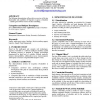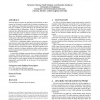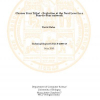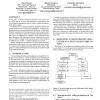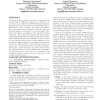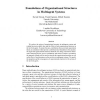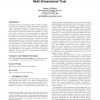126
Voted
ATAL
2005
Springer
15 years 6 months ago
2005
Springer
Rational strategic reasoning is the process whereby an agent reasons about the best strategy to adopt in a given multi-agent scenario, taking into account the likely behaviour of ...
ATAL
2005
Springer
15 years 6 months ago
2005
Springer
The following demonstration will provide an overview of the key functionality and capabilities of Magenta’s Logistics i-Scheduler – a multi-agent software tool for real time s...
120
Voted
ATAL
2005
Springer
15 years 6 months ago
2005
Springer
Whilst tools assist the various tasks required to develop a multi-agent system (MAS), yet there still remains a gap between the generation of MAS models and program code. AUML dev...
152
Voted
ATAL
2005
Springer
15 years 6 months ago
2005
Springer
The next generation of air traffic control will require automated decision support systems in order to meet safety, reliability, flexibility, and robustness demands in an environ...
100
Voted
ATAL
2005
Springer
15 years 6 months ago
2005
Springer
Decision-support requires the gathering and presentation of information, but is subject to many kinds of resource restrictions (e.g. cost, length, time). Individual users differ n...
ATAL
2005
Springer
15 years 6 months ago
2005
Springer
ATAL
2005
Springer
15 years 6 months ago
2005
Springer
In this paper, we present, through simulations of the coffee market of the state of Veracruz, how emergence of specialized roles in participatory simulations could be used to desi...
ATAL
2005
Springer
15 years 6 months ago
2005
Springer
Collaboration plays a critical role when a team is striving for goals that are difficult to achieve by an individual. In previous work, we defined the ETAPP (Environment-TaskAgen...
104
click to vote
ATAL
2005
Springer
15 years 6 months ago
2005
Springer
We analyze the notion of organizational structure in multiagent systems and explain the precise added value and the effects of such organizational structure on the involved agents...
98
Voted
ATAL
2005
Springer
15 years 6 months ago
2005
Springer
Cooperation among autonomous agents involves an inherent degree of uncertainty. Agents determine for themselves when to initiate cooperation or to assist others, when to rescind c...

